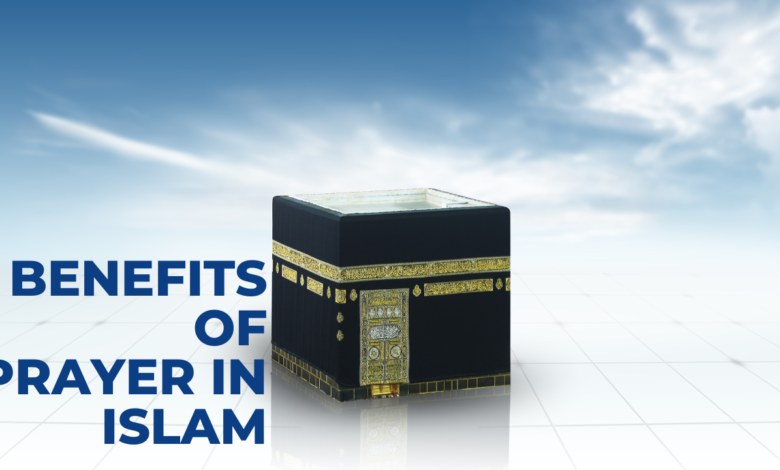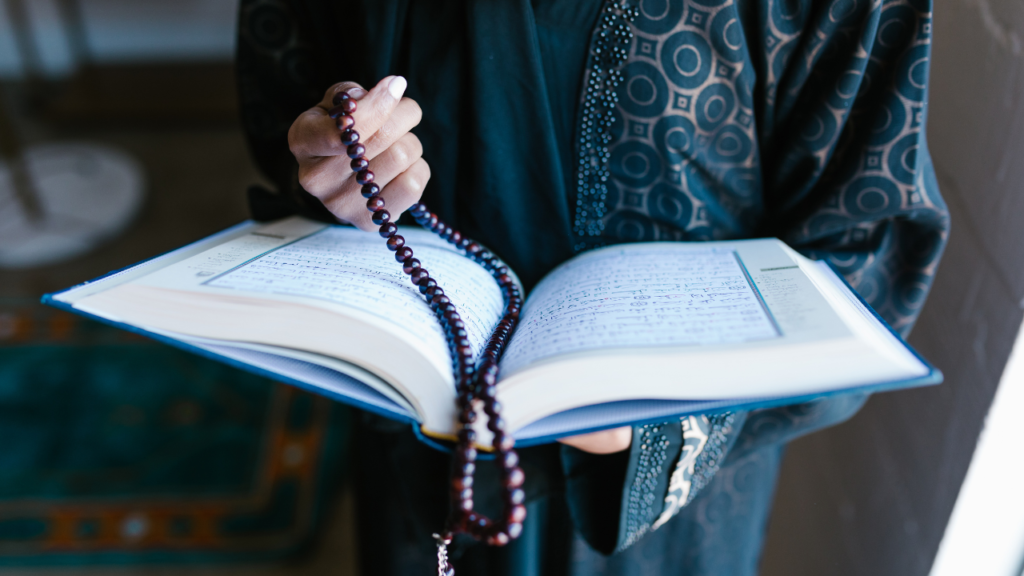Benefits of Prayer in Islam
The Many Facets of Prayer: Exploring the Benefits of Salat in Islam

Benefits of Prayer in Islam
Salat is the Arabic term for prayer in Islam. It is crucial because it is one of the Five Pillars of Islam and serves as a direct means of communication between Muslims and Allah.

Introduction
Prayer, known as “Salat” in Islam, is a fundamental pillar of the faith and a daily practice for millions of Muslims around the world. It holds deep spiritual and practical significance in the lives of believers, and its benefits extend far beyond the act of worship itself. Here, we explore the numerous advantages of prayer in Islam, highlighting the physical, mental, and spiritual benefits it offers.
Spiritual Connection:
One of the primary and most profound benefits of prayer in Islam is the establishment of a direct and intimate connection with Allah (God). Muslims believe that through prayer, they can converse with and seek guidance from their Creator. This connection nurtures a deep sense of spirituality and reinforces their faith.
Discipline and Routine:
Daily prayers in Islam are performed at specific times: dawn, noon, mid-afternoon, sunset, and evening. This structured routine helps instill discipline in the lives of Muslims, teaching them to manage their time effectively and prioritize their spiritual commitments. Regularly practicing prayer becomes a cornerstone of their daily schedule.
Also check.
- What is Quran?
- What is Haram?
- Who is the Current Caliph of Islam?
- What does Muslims Believe in?
- Where did Islam Originate?
Moral and Ethical Development:
The act of prayer encourages reflection and introspection. During prayer, Muslims recite verses from the Quran and engage in supplication, which often includes seeking forgiveness and guidance. This self-reflection helps individuals become more aware of their actions, leading to moral and ethical growth. It reminds them of their responsibilities and obligations to themselves, their families, and society.
Stress Reduction:
Praying can have a calming and stress-reducing effect. The physical postures of prayer, such as bowing and prostration, promote relaxation and provide moments of mental reprieve. This can be especially beneficial in a fast-paced, stressful world, as it allows individuals to take a break from their daily concerns and recenter their thoughts.
Community and Unity:
While individual prayer is highly important, communal prayers, especially the Friday congregational prayer (Jumu’ah), provide opportunities for Muslims to come together as a community. This fosters a sense of unity and solidarity among believers, enhancing social bonds and promoting mutual support.
Health Benefits:
The physical movements involved in Islamic prayer are akin to gentle exercise routines. These movements help improve flexibility, balance, and posture. Regular prayer can have a positive impact on overall physical health, reducing the risk of joint problems and musculoskeletal issues. Moreover, the act of prostration is believed to stimulate blood circulation and promote mental well-being.
Time for Gratitude:
Muslims are encouraged to express gratitude to Allah during their prayers. This practice of acknowledging blessings and showing appreciation for the good in one’s life can lead to a more positive outlook, increased happiness, and a stronger sense of contentment.
A Shield Against Wrongdoing:
Consistent prayer can serve as a protective shield against sinful behavior. Believers turn to prayer as a means of seeking forgiveness for their transgressions, which motivates them to avoid harmful actions. The consciousness of being accountable to a higher power helps individuals make morally sound choices.
Guidance and Wisdom:
Through prayer, Muslims seek guidance and wisdom from Allah. This spiritual guidance can lead to a deeper understanding of life’s challenges, personal dilemmas, and the path to righteousness.
Empowerment:
Prayer can instill a sense of empowerment and hope, providing solace during difficult times. It reminds Muslims that they are not alone in their struggles and that there is always a source of strength and support available to them through their faith.
Conclusion
In conclusion, the benefits of prayer in Islam are not limited to the religious realm. They extend into the physical, mental, and emotional aspects of a person’s life. Prayer serves as a daily reminder of faith, discipline, and gratitude, offering a holistic approach to living a fulfilling and meaningful life. For Muslims, it is a source of comfort and spiritual nourishment, enriching their journey through this world.

FAQs
What is Salat in Islam, and why is it important?
Salat is the Arabic term for prayer in Islam. It is crucial because it is one of the Five Pillars of Islam and serves as a direct means of communication between Muslims and Allah.
What are the physical benefits of performing daily prayers in Islam?
Regular prayer involves physical movements that can improve flexibility, posture, and balance. It also promotes relaxation and stress reduction.
How does prayer promote mental well-being?
The act of prostration during prayer stimulates blood circulation and provides moments of mental reprieve, helping to reduce stress and anxiety.
In what ways does prayer in Islam contribute to moral and ethical development?
Prayer encourages self-reflection, seeking forgiveness, and expressing gratitude. This fosters moral and ethical growth by making individuals more aware of their actions and responsibilities.
Can prayer be a source of empowerment for Muslims?
Yes, prayer instills a sense of empowerment and hope, offering solace during difficult times. It reminds Muslims that they are not alone in their struggles and that there is a source of strength through their faith.
How does prayer bring the Muslim community together?
Communal prayers, such as the Friday congregational prayer (Jumu’ah), provide opportunities for Muslims to come together, fostering a sense of unity and social bonds among believers.
Are there specific prayers for seeking guidance and wisdom in Islam?
Muslims can seek guidance and wisdom through their daily prayers by reciting verses from the Quran and engaging in supplication.
Can consistent prayer serve as a shield against wrongdoing?
Yes, many Muslims turn to prayer as a means of seeking forgiveness for their transgressions, which motivates them to avoid sinful behavior.
How does prayer encourage gratitude among Muslims?
Muslims are encouraged to express gratitude to Allah during their prayers, leading to a more positive outlook, increased happiness, and a stronger sense of contentment.
Is there scientific evidence supporting the health benefits of prayer in Islam?
While prayer is not a substitute for medical care, there is some evidence suggesting that the physical movements involved in Islamic prayer can have a positive impact on physical health, such as joint and musculoskeletal health.
How can I incorporate the benefits of prayer into my daily life, even if I’m not Muslim?
While the specific rituals of Islamic prayer are for Muslims, practices like mindfulness, meditation, and gratitude can be incorporated into daily life to reap some of the spiritual and mental benefits of prayer.
Are there specific times for each daily prayer in Islam?
Yes, the daily prayers in Islam are performed at specific times: dawn, noon, mid-afternoon, sunset, and evening, which helps establish a structured routine in the lives of Muslims.




